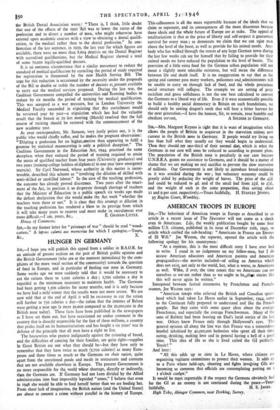HUNGER IN GERMANY
hope you will publish this appeal from a soldier in B.A.O.R. for an attitude of greater realism on the part of British public opinion and the British Government (who are at the moment intimidated by the com- plaints of the more vocal section of the community) towards the question of food in Europe, and in particular of feeding our zone in Germany. Some weeks ago we were suddenly told that it would be necessary to cut the rations there to t,000 calories a day ; 1,700 calories a day is regarded as the minimum necessary to maintain health. The Germans had been getting 1,50o calories for many months, and it is only because we have had a mild winter that the results were not more severe. We are now told that at the end of Apiil it will be necessary to cut the ration still further to 75o calories a day—the ration that the inmates of Belsen were getting a year ago (a mere 20,000 compared to the 20,000,000 in the British zone today). These facts have been published in the newspapers as I have set them out, but have occasioned no undue comment in the country that is directly responsible for the fate of these millions, a country that prides itself on its humanitarianism and has fought a six years' war in defence of the principle that all men have a right to live.
The housewives who protest indignantly against the rationing of bread, and the difficulties of catering for their families, are quite right—supplies in Great Britain are not what they should be—but they have only to remember that they have twice as much (2,700 calories) as many Euro- peans and three times as much as the Germans on their ration, quite apart from the unrationed goods and meals in restaurants and canteens that are not available elsewhere in Europe. The present Government is no more responsible for the world wheat shortage, directly or indirectly, than the Germans are. If Germany had not been divided by the Allied administration into four impossibly lopsided " zones," I believe that even in 1946 she would be able to feed herself better than we are feeding her. From sheer lack of imagination, the British nation (and the United States) are about to commit a crime without parallel in the history of Europe.
This callousness is all the more regrettable because of the ideals that we claim to represent, and its consequences all the more disastrous because those ideals and the whole future of Europe are at stake. The appeal of totalitarianism is that at the price of liberty and self-respect it guarantees survival for every man ; as democrats we claim that we can raise man above the level of the beast, as well as provide for his animal needs. Any- body who has walked through the streets of any large German town during the last few weeks can see for himself that by failing to provide for their animal needs we have reduced the population to the level of beasts. The provision of a little extra food for the German urban population will not mean a slightly more tolerable existence, but will mean the difference between life and death itself. It is no exaggeration to say that as the spring and summer pass many workers, policemen and administrators will be unable to carry on through lack of food, and the whole precarious social structure will collapse. The example we are setting of petty racialism and gross selfishness is not the one best calculated to convert the Germans to a liberal way of life. Even if it were economically possible to build a healthy social democracy in Britain on such foundations, we should only be sowing dragon's teeth that will bear a bitter harvest for the next generation.—I have the honour, Sir, to remain, your humble and






























 Previous page
Previous page